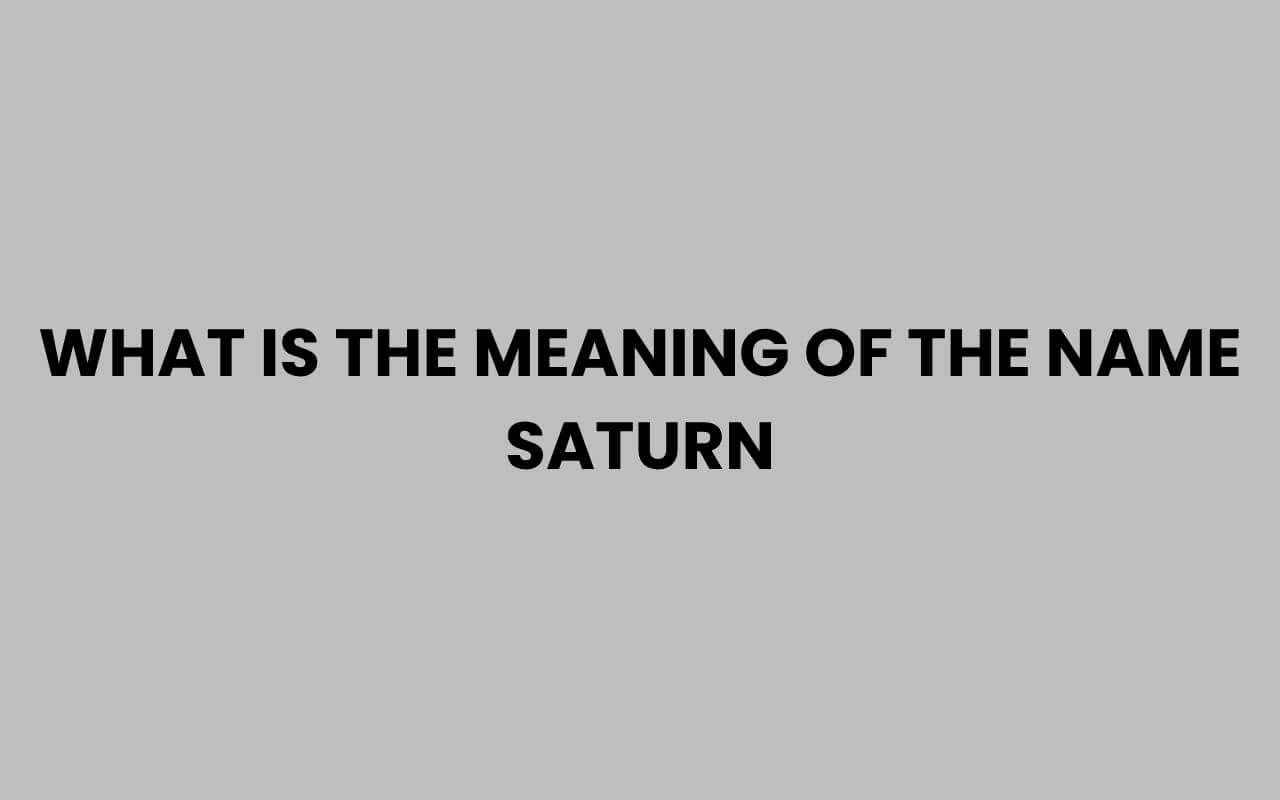The name Saturn carries deep historical, mythological, and cultural significance. It originates from ancient Roman mythology, where Saturn was a major deity associated with agriculture, wealth, and time.
Understanding the name Saturn requires exploring its origins, symbolic meanings, and its influence across different fields such as astronomy, astrology, and cultural traditions.
At its core, the name Saturn symbolizes concepts of time, cycles, discipline, and transformation. This multifaceted significance has made Saturn a powerful symbol throughout history, reflected in language, literature, and science.
Origin and Etymology of Saturn
The name Saturn is derived from the Latin word “Saturnus”. In Roman mythology, Saturn was a god often identified with the Greek titan Cronus.
The etymology of the name is believed to relate to the Latin verb “serere”, meaning “to sow,” which links Saturn closely to agriculture and sowing crops.
This agricultural connection underscores Saturn’s role as a god of sowing, seed, and harvest. The Romans celebrated this deity’s influence in their festival of Saturnalia, a time of feasting and reversal of social roles.
Saturn in Roman Mythology
In Roman mythology, Saturn was one of the most important gods. He was the father of several key deities including Jupiter, Neptune, and Pluto.
As a god of agriculture, Saturn was revered for teaching humans how to cultivate the land, thereby fostering civilization and prosperity.
The mythology surrounding Saturn is complex. He was often depicted as a stern yet just figure who presided over time and renewal.
His reign was considered a golden age of peace and abundance before the rise of Jupiter.
“Saturn’s reign was a time of harmony, where humanity lived free from want and conflict, nourished by the earth’s bounty.” – Ancient Roman Text
The Symbolism of Saturn
The symbolism attached to the name Saturn is rich and varied. It spans themes such as time, discipline, limitation, and renewal.
Saturn is often portrayed holding a sickle or scythe, symbolizing both the harvest and the passage of time.
In many traditions, Saturn represents:
- Time: The inevitable progression of life and seasons.
- Discipline: Structure, rules, and responsibility.
- Cycles: Birth, death, and rebirth.
- Transformation: Growth through hardship and limitation.
Saturn in Astronomy
The name Saturn was given to the sixth planet from the Sun, the second-largest in our Solar System. Discovered by ancient civilizations, Saturn’s striking rings made it one of the most distinctive celestial bodies visible to the naked eye.
The planet’s association with the god Saturn deepens its symbolic meanings. In astronomy, the planet Saturn is often linked to coldness, distance, and structure, mirroring its mythological connotations of discipline and time.
| Aspect | Details |
|---|---|
| Orbital Position | 6th planet from the Sun |
| Diameter | Approximately 116,460 km |
| Rings | Prominent and complex ring system made of ice and rock |
| Orbital Period | About 29.5 Earth years |
| Moons | 82 confirmed moons as of 2024 |
Saturn in Astrology
In astrology, Saturn holds a pivotal role as the planet of discipline, responsibility, and karmic lessons. It governs the zodiac signs Capricorn and, traditionally, Aquarius.
Saturn’s influence is often associated with challenges and limitations that encourage growth and maturity.
Astrologers view Saturn as a teacher who imposes boundaries and tests resolve. Its placement in a natal chart reveals where a person might face obstacles but also where they can develop resilience and wisdom.
“Saturn teaches us patience and perseverance, reminding us that true strength is forged through trials and time.” – Astrological Wisdom
Astrological Attributes of Saturn
| Attribute | Description |
|---|---|
| Element | Earth (Capricorn) and Air (Aquarius) |
| Associated Zodiac Signs | Capricorn, Aquarius (traditional) |
| Key Themes | Discipline, responsibility, limitation, karma |
| Symbol | Sickle or scythe |
| Planetary Day | Saturday |
Cultural and Literary References to Saturn
Throughout history, the name Saturn has appeared in numerous cultural and literary contexts. The Roman festival Saturnalia, celebrated in December, was a time of joyous revelry, gift-giving, and social inversion.
This festival influenced many modern winter holiday traditions.
In literature, Saturn is often used as a metaphor for time, decay, and inevitability. Poets and writers have drawn upon the imagery of Saturn to explore themes of mortality and the passage of time.
“The shadow of Saturn falls upon all men, reminding them of their fleeting hours.” – William Blake
The Name Saturn in Modern Usage
Today, the name Saturn is still widely recognized and used beyond mythology and astronomy. It appears in brand names, such as the American automobile marque Saturn, evoking ideas of strength and endurance.
The symbolic power of Saturn also influences modern spirituality and psychology. The archetype of Saturn represents the wise elder, the gatekeeper of boundaries, and the force that challenges individuals to grow through discipline.
Summary of the Meaning of the Name Saturn
| Aspect | Meaning |
|---|---|
| Mythological Origin | Roman god of agriculture, time, and wealth |
| Etymology | Derived from Latin “serere” meaning “to sow” |
| Symbolism | Time, cycles, discipline, transformation |
| Astronomy | Sixth planet from the Sun with prominent rings |
| Astrology | Planet of responsibility, karma, and life lessons |
| Cultural Influence | Festival Saturnalia, literary symbol of time and mortality |
Conclusion
The name Saturn embodies a profound blend of meanings that span ancient mythology, celestial phenomena, and human psychology. It reminds us of the natural cycles governing life and the importance of discipline and responsibility in personal growth.
Whether encountered in stories, the night sky, or astrological charts, Saturn continues to inspire a deeper understanding of time, transformation, and the enduring rhythms that shape existence.

